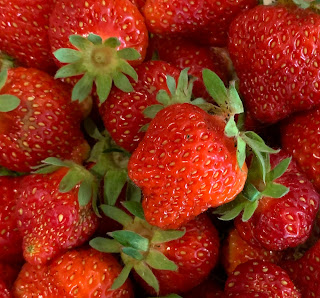I Did Not Have Mythically Everlasting Strawberry Plants.
I overheard someone recently say that strawberry plants only last a few years and then they stop producing fruit. My plants must not have read their own instructions; our patch has been producing for 11 years. Maybe they were the exception.
The harvest typically comes in late May or early June, later in the season this year due to our cool weather. I root around in the patch every day for about two weeks, checking berries, popping them into my mouth or a plastic container, or feeding one to the dog as a special treat. Production is coming to an end, however, and yesterday I was crouching low to the ground, lifting leaves and pushing away vines to find the stragglers. I should mention that this patch is pure chaos. There are dandelions growing up, strangled by the runners. There is some sort of spreading, purple-flowering weed that grows back every spring, and every spring, I grab fistfuls and snap them out of the patch, making sure I don't grab tendrils of strawberry plant, too.
Yesterday, my container full and my legs tired from crouching, I straightened up and backed away from the patch, which sits at the top of an easy slope that declines into our side yard. As I backed down and away, several bright flashes of blood-red, low to the ground, caught my eye through the side of the bedraggled plastic mesh fence that, in a manner of speaking, borders the patch. As I moved forward to inspect their whereabouts up close, they were lost again, and my hands dove several layers down, parting the plants like the Red Sea until I came to thick underbrush of dried vines and dead weeds on the bottom of the patch. There they sat gleaming and ripe, and also cushioned and protected against the wet soil by so much death. That's what it was: I did not have mystically everlasting strawberry plants; my patch was filled with plants that bore fruit, sent out runners, and died. And how convenient that last year's plants died so that this year's fruit might live, safe from rot and hidden from the habits of rabbits and birds. My eyes locked hard on those berries propped up by their own death-bed.
There are many deaths that I have died, proof that the American Dream and the Christian prosperity gospel are the stuff of myth, that hard work does not equal success, that obedience does not lead to "happiness." The myths, the dreams, were planted, sent out runners and died. He said, whoever finds her life must lose it, and whoever loses her life for my sake will find it.
He might as well have said I should be propped up by my own death-bed if I really want to live. If I had to name the death-bed, I'd call it control, or foresight. Slowly and steadily, the illusion of control is stripped away as my children age, as I cannot stop war in Ukraine, prevent this sky-rocketing inflation, or wisely think of something that will cause neighbors to reconcile with one another. My demand that He grant me foresight as if it is a birthright, is quietly waning; I know now it was never my right to see so far ahead, or to be so sure.
You have called me
To float blind down the river which leads to
The kingdom of light."
To float blind down a river is practically the definition of the death of control and foresight. To trust that this river will carry you into the kingdom of light is to believe in resurrection, that the sustenance of living wild berries and fresh green runners will be nourished by compost.

Comments
Post a Comment